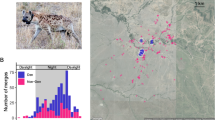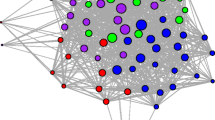Abstract
Inferring the latent structures of social organisations is a central theme in animal ecology. Sophisticated theoretical frameworks underpin the study of various primate social systems. Single-file movements, defined as serially ordered patterns of animals, reflect intra-group social relationships and provide a key to understanding social structures. Here, we analysed automated camera-trapping data on the order of progression of single-file movements in a free-ranging group of stump-tailed macaques to estimate the social structure of the group. The sequence of single file movements showed some regularities, particularly for adult males. Social network analysis identified four community clusters (subgroups) corresponding to the social structures reported for these stumptailed macaques, i.e. males that had copulated more frequently with females were spatially clustered with females, but males that had copulated less frequently were spatially isolated from females. Our results suggest that stumptailed macaques move in regular, socially determined patterns that reflect the spatial positions of adult males and are related to the social organisation of the species.


Similar content being viewed by others
References
Altmann J (1974) Observational study of behavior: sampling methods. Behaviour 49:227–267. https://doi.org/10.1163/156853974x00534
Altmann SA (1979) Baboon progressions: order or chaos? A study of one-dimensional group geometry. Anim Behav 27:46–80. https://doi.org/10.1016/0003-3472(79)90128-3
Aureli F, Schaffner CM, Verpooten J, Slater K, Ramos-Fernandez G (2006) Raiding parties of male spider monkeys: insights into human warfare? Am J Phys Anthropol 131:486–497. https://doi.org/10.1002/ajpa.20451
Barelli C, Reichard U, Boesch C, Heistermann M (2008) Female white-handed gibbons (Hylobates lar) lead group movements and have priority of access to food resources. Behaviour 145:965–981. https://doi.org/10.1163/156853908784089243
Bernstein IS (1976) Dominance, aggression and reproduction in primate societies. J Theor Biol 60:459–472. https://doi.org/10.1016/0022-5193(76)90072-2
Butovskaya M (1993) Kinship and different dominance styles in groups of three species of the genus Macaca (M. arctoides, M. mulatta, M. fascicularis). Folia Primatol (Basel) 60:210–224. https://doi.org/10.1159/000156694
Caine N, Mitchell G (1979) A review of play in the genus Macaca: social correlates. Primates 20:535–546. https://doi.org/10.1007/bf02373435
Clutton-Brock T (2016) Mammal societies. Wiley
de Waal FBM, Luttrell LM (1989) Toward a comparative socioecology of the genus Macaca: different dominance styles in rhesus and stumptail monkeys. Am J Primatol 19:83–109. https://doi.org/10.1002/ajp.1350190203
de Waal FBM, Ren R (1988) Comparison of the reconciliation behavior of stumptail and rhesus macaques. Ethology 78:129–142. https://doi.org/10.1111/j.1439-0310.1988.tb00224.x
Dore KM et al (2020) Review of GPS collar deployments and performance on nonhuman primates. Primates. https://doi.org/10.1007/s10329-020-00793-7
Erhart EM, Overdorff DJ (1999) Female coordination of group travel in wild Propithecus and Eulemur. Int J Primatol 20:927–940. https://doi.org/10.1023/a:1020830703012
Estep DQ, Nieuwenhuijsen K, Bruce KEM, De Neef KJ, Walters PA, Baker SC, Koos Slob A (1988) Inhibition of sexual behaviour among subordinate stumptail macaques, Macaca arctoides. Anim Behav 36:854–864. https://doi.org/10.1016/s0003-3472(88)80168-4
Fischhoff IR, Sundaresan SR, Cordingley J, Larkin HM, Sellier M-J, Rubenstein DI (2007) Social relationships and reproductive state influence leadership roles in movements of plains zebra, Equus burchellii. Anim Behav 73:825–831. https://doi.org/10.1016/j.anbehav.2006.10.012
Furuichi T (1989) Social interactions and the life history of female Pan paniscus in Wamba, Zaire. Int J Primatol 10:173–197. https://doi.org/10.1007/bf02735199
Gouzoules H (1974) Harassment of sexual behavior in the stumptail macaque, Macaca arctoides. Folia Primatol (Basel) 22:208–217. https://doi.org/10.1159/000155625
Hinde R (1976) Interactions, relationships and social structure. Man 11:1–17
Hockings KJ (2011) Behavioral flexibility and division of roles in chimpanzee road-crossing. In: Matsuzawa T, Humle T, Sugiyama Y (eds) The chimpanzees of Bossou and Nimba. Springer, Tokyo, pp 221–229
Hockings KJ, Anderson JR, Matsuzawa T (2006) Road crossing in chimpanzees: a risky business. Curr Biol 16:R668-670. https://doi.org/10.1016/j.cub.2006.08.019
Hongo S (2014) New evidence from observations of progressions of mandrills (Mandrillus sphinx): a multilevel or non-nested society? Primates. https://doi.org/10.1007/s10329-014-0438-y
Hrdy SB (1980) The langurs of Abu: female and male strategies of reproduction. Harvard University Press, Cambridge
Jacobs A, Watanabe K, Petit O (2011) Social structure affects initiations of group movements but not recruitment success in Japanese macaques (Macaca fuscata). Int J Primatol 32:1311–1324. https://doi.org/10.1007/s10764-011-9554-3
Kappeler PM, Watts DP (2012) Long-term field studies of primates
Kawai M (1964) Ecology of Japanese macaques (Nihonzaru no seitai). Kawadeshobo, Tokyo (in Japanese)
Kawazoe T, Sosa S (2019) Social networks predict immigration success in wild Japanese macaques. Primates 60:213–222. https://doi.org/10.1007/s10329-018-0702-7
Koda H, Arai Z, Matsuda I (2020) Agent-based simulation for reconstructing social structure by observing collective movements with special reference to single-file movement. PLoS ONE 15:e0243173. https://doi.org/10.1371/journal.pone.0243173
Lott DF (1984) Intraspecific variation in the social-systems of wild vertebrates. Behaviour 88:266–325. https://doi.org/10.1163/156853984x00353
Matsuda I, Zhang P, Swedell L, Mori U, Tuuga A, Bernard H, Sueur C (2012) Comparisons of intraunit relationships in nonhuman primates living in multilevel social systems. Int J Primatol 33:1038–1053. https://doi.org/10.1007/s10764-012-9616-1
Matsumura S (1999) The evolution of “egalitarian” and “despotic” social systems among macaques. Primates 40:23–31. https://doi.org/10.1007/BF02557699
Mitani JC, Watts DP (2005) Correlates of territorial boundary patrol behaviour in wild chimpanzees. Anim Behav 70:1079–1086. https://doi.org/10.1016/j.anbehav.2005.02.012
Mizuno K, Sharma N, Gi I, Sukumar R (2017) Collective behaviour of wild Asian elephants in risky situations: how do social groups cross roads? Behaviour 154:1215–1237. https://doi.org/10.1163/1568539x-00003465
Morita T, Toyoda A, Aisu S, Kaneko A, Suda-Hashimoto N, Adachi I, Matsuda I, Koda H (2021) Nonparametric analysis of inter-individual relations using an attention-based neural network. MEE 12:1425–1440. https://doi.org/10.1111/2041-210x.13613
Niemeyer CL, Chamove AS (1983) Motivation of harassment of matings in stumptailed macaques. Behaviour 87:298–322. https://doi.org/10.1163/156853983x00480
Overdorff DJ, Erhart EM, Mutschler T (2005) Does female dominance facilitate feeding priority in black-and-white ruffed lemurs (Varecia variegata) in southeastern Madagascar? Am J Primatol 66:7–22. https://doi.org/10.1002/ajp.20125
Perony N, Townsend SW (2013) Why did the meerkat cross the road? Flexible adaptation of phylogenetically-old behavioural strategies to modern-day threats. PLoS ONE 8:e52834. https://doi.org/10.1371/journal.pone.0052834
Peterson RO, Jacobs AK, Drummer TD, Mech LD, Smith DW (2002) Leadership behavior in relation to dominance and reproductive status in gray wolves, Canis lupus. Can J Zool 80:1405–1412. https://doi.org/10.1139/z02-124
Petit O, Abegg C, Thierry B (1997) A comparative study of aggression and conciliation in three cercopithecine monkeys (Macaca Fuscata, Macaca Nigra, Papio Papio). Behaviour 134:415–432. https://doi.org/10.1163/156853997x00610
Prins HHT (1989) Buffalo herd structure and its repercussions for condition of individual African buffalo cows. Ethology 81:47–71. https://doi.org/10.1111/j.1439-0310.1989.tb00757.x
Puga-Gonzalez I, Sosa S, Sueur C (2019) Editorial: social networks analyses in primates, a multilevel perspective. Primates 60:163–165. https://doi.org/10.1007/s10329-019-00720-5
Schino G (2001) Grooming, competition and social rank among female primates: a meta-analysis. Anim Behav 62:265–271. https://doi.org/10.1006/anbe.2001.1750
Stanford CB (1991) The capped langur in Bangladesh: behavioral ecology and reproductive tactics. Karger, New York
Strandburg-Peshkin A, Farine DR, Couzin ID, Crofoot MC (2015) Shared decision-making drives collective movement in wild baboons. Science 348:1358–1361. https://doi.org/10.1126/science.aaa5099
Struhsaker TT (1975) Red colobus monkey. University of Chicago Press
Sueur C, Petit O (2008) Organization of group members at departure is driven by social structure in Macaca. Int J Primatol 29:1085–1098. https://doi.org/10.1007/s10764-008-9262-9
Sueur C, Petit O (2010) Signals use by leaders in Macaca tonkeana and Macaca mulatta: group-mate recruitment and behaviour monitoring. Anim Cogn 13:239–248. https://doi.org/10.1007/s10071-009-0261-9
Sugiyama Y (1988) Grooming interactions among adult chimpanzees at Bossou, Guinea, with special reference to social structure. Int J Primatol 9:393–407. https://doi.org/10.1007/bf02736216
Takahashi H, Furuichi T (1998) Comparative study of grooming relationships among wild Japanese macaques in Kinkazan A troop and Yakushima M troop. Primates 39:365–374. https://doi.org/10.1007/bf02573084
Thierry B (2011) The macaques: a double-layered social organization. In: Campbell CJ, Fuentes A, Mackinnon KC, Bearder SK, Stumpf RM (eds) Primates in perspective. Oxford University Press, Oxford, pp 229–241
Toyoda A, Maruhashi T, Malaivijitnond S, Koda H (2020a) Dominance status and copulatory vocalizations among male stump-tailed macaques in Thailand. Primates 61:685–694. https://doi.org/10.1007/s10329-020-00820-7
Toyoda A, Maruhashi T, Malaivijitnond S, Koda H, Ihara Y (2020b) Mate sharing in male stump-tailed macaques as a possible case of coalition-like behavior to modify the group-wise fitness distribution. BioRxiv. https://doi.org/10.1101/2020.01.30.927772
Toyoda A, Maruhashi T, Kawamoto Y, Matsudaira K, Matsuda I, Malaivijitnond S (2022) Mating and reproductive success in free-ranging stump-tailed macaques: effectiveness of male–male coalition formation as a reproductive strategy. Front Ecol Evol 10:802012. https://doi.org/10.3389/fevo.2022.802012
Trivers RL (1972) Parental investment and sexual selection. In: Campbell B (ed) Sexual selection and the descent of man. Aldine, Chicago, pp 136–179
Wang X, Sun L, Li J, Xia D, Sun B, Zhang D (2015) Collective movement in the Tibetan macaques (Macaca thibetana): early joiners write the rule of the game. PLoS ONE 10:e0127459. https://doi.org/10.1371/journal.pone.0127459
Acknowledgements
We are grateful to Chuchat Choklap, the superintendent of the Khao Krapuk Khao Taomor Non-Hunting Area; Phanlerd Inprasoet, Wanchai Inprasoet and Napatchaya Techaatiwatkun for providing valuable support that ensured the success of our fieldwork; Y. Kawamoto for support in the genetic analysis; Y. Hamada, I. Adachi and T. Nishimura for their support of our research. This study was funded by Japan Society for the Promotion of Science Grants-in-Aid for Scientific Research (KAKENHI) (nos. 16J0098 and 22K13802 to AT, no. 19KK0191 to IM); a Young Science Explorer Grant of the National Geographic Foundation for Science and Exploration–Asia (to AT); the Kyoto University Foundation (to AT); a Japan Science Society Sasakawa Scientific Research Grant (to AT); the Cooperation Research Programs of the Wildlife Research Center and Primate Research Institute, Kyoto University (to AT); Japan Science and Technology Agency Core Research for Evolutional Science and Technology 17941861 (no. JPMJCR17A4); and a Ministry of Education, Culture, Sports, Science and Technology Grant-in-Aid for Scientific Research on Innovative Areas no. 4903 (Evolinguistics) 17H06380.
Author information
Authors and Affiliations
Corresponding authors
Ethics declarations
Conflict of interest
The authors declare that they have no conflict of interest.
Ethics approval
All data acquisitions and procedures carried out during the fieldwork were approved by the National Research Council of Thailand (no. 0002/6910) and the Department of National Parks, Wildlife and Plant Conservation of Thailand.
Informed consent
Not applicable for this study (because it was a study on wild animals).
Additional information
Publisher's Note
Springer Nature remains neutral with regard to jurisdictional claims in published maps and institutional affiliations.
Supplementary Information
Below is the link to the electronic supplementary material.
About this article
Cite this article
Toyoda, A., Maruhashi, T., Malaivijitnond, S. et al. Macaque progressions: passing order during single-file movements reflects the social structure of a wild stump-tailed macaque group. Primates 64, 351–359 (2023). https://doi.org/10.1007/s10329-023-01055-y
Received:
Accepted:
Published:
Issue Date:
DOI: https://doi.org/10.1007/s10329-023-01055-y




